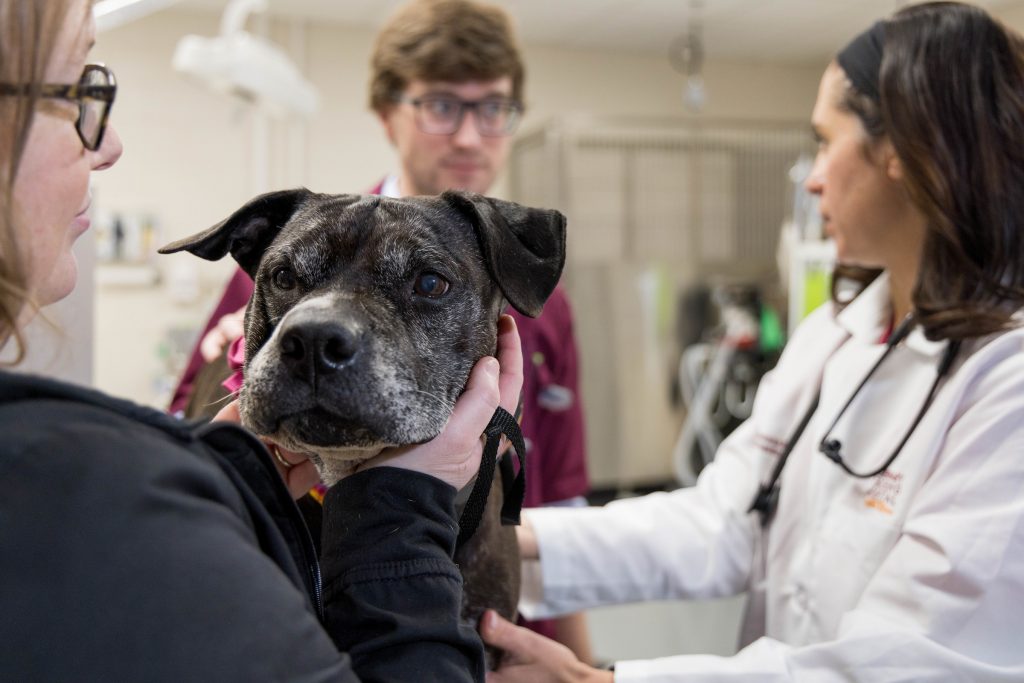Using a unique urinalysis technique, researchers at Virginia Tech have created a simple, noninvasive, rapid screen to detect the presence of cancer in dogs.
7 Feb 2024
A dog undergoes a health check-up and physical examination at the Virginia-Maryland College of Veterinary Medicine. Photo by Andrew Mann for Virginia Tech.
Note to readers: The test for detecting cancer in dogs through urine analysis is currently in the research phase and is only available via specific medical studies called clinical trials with limited access. This promising technology is still several years away from public availability. We appreciate interest in this research and will provide future updates on its progress.
Cancer is common in dogs, with some breeds being more prone to certain variations of the disease than others. Recent studies have shown that nearly half of dogs over the age of 10 will develop cancer, making early screening a crucial precaution for dog owners of any breed.
Researchers in the College of Engineering, College of Agriculture and Life Sciences, and the Virginia-Maryland College of Veterinary Medicine have developed a new, noninvasive, rapid test using a dog’s urine that allows for potential early detection of cancer. Currently, there are three genomic blood tests that can test for tumor or cancer proteins, but no noninvasive rapid tests using urine currently exist. The team’s promising findings were published in Frontiers in Veterinary Science.
Researchers considered a broad spectrum of cancer types and decided to focus on the most common types present in dogs, such as lymphoma. Using a new application of Raman spectroscopy, researchers sampled urine and found through the display of molecules that cancerous subjects had a unique "fingerprint" that could be used to indicate the presence of cancer.
“If a new patient comes into the clinic and provides a urine sample, we can compare it against our database of urine scans to determine if the sample more closely matches a cancer fingerprint or a healthy fingerprint,” said Ryan Senger, associate professor in the Department of Biological Systems Engineering. “With the research that we have done so far, we were more than 90 percent accurate at being able to tell if a new sample had cancer fingerprint or a healthy fingerprint.”
These results are significant for several reasons. Blood tests are often only about 60 percent accurate, are expensive, and are performed in a lab. Instead of having to wait for the results of a blood test, this cost-effective screening provides a preliminary understanding into whether a dog has the markers of cancer in a matter of minutes. As a noninvasive screening, it also has the potential to be done at home.
“Owners could go from paying for expensive testing every few months, to having a urine screening done once every few months, depending on the dog’s risk for cancer, if they wanted to,” said Nikolaos Dervisis, associate professor of oncology at Virginia-Maryland College of Veterinary Medicine. “This screening would allow veterinarians to decide if further comprehensive testing is needed based on the results.”
As the research progresses, the team hopes to be able to not only detect cancer in dogs, but assess a dog’s response to therapy and evaluate the recurrence of tumors and cancer. Additionally, team members hope to use the screening tool in other animals. There is even potential future use in human health studies.
Concerning future applications, John Robertson, research professor in the Department of Biomedical Engineering and Mechanics, said, “We could potentially measure responses to medicine and chemotherapy in dogs already undergoing treatment, then monitor those dogs to see how they’re doing. Can we differentiate the kind of diseases we screen for? Which patients are responding to drugs and why? We’re currently working to collaborate with other institutions to further explore how all these factors can be beneficial.”
Chelsea Seeber
540-231-2108
Virginia Tech demonstrates impact as a global land grant – progressing sustainability in our community, through the Commonwealth of Virginia, and around the world.
Get Directions
See All Locations
Contact Virginia Tech
For the media
© 2024 Virginia Polytechnic Institute and State University. All rights reserved.

